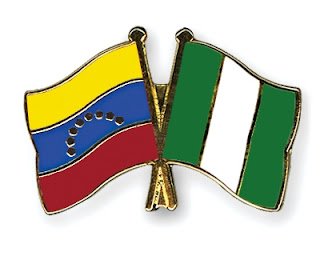 |
| Image: Crossed Flagpins |
I remember the first time Venezuela ever came to my consciousness in a significant way. It was during my teen years, following the Miss World pageants; there had been a lot of winners from South America generally but particularly Venezuela. Venezuela holds the Guinness world record for being the only country to win back to back titles in the Miss Universe pageants in 2008 and 2009. Venezuela also ranks right on top in terms of the number of International beauty pageants it has won. Here is a country that could legitimately lay claim to having the most beautiful women in the world.
The former Spanish colony also boasts the largest oil
reserves in the world, is a founding member of the global oil cartel, Organisation
of Petroleum Exporting Countries (OPEC) and has consistently been one of the
world’s foremost oil exporters. I want that to really sink in, ‘largest proven
oil reserves’, founding member of OPEC (and why not, it has the largest
freaking oil reserves in the world) and consistent leading global exporter of
oil. The most beautiful women in the
world, loads of oil, Venezuela certainly seemed to have a lot going for it.
Venezuela obtained a hard fought independence from the
Spanish in the 18th century and its history since then is strewn with
nationalists on different levels that have tried to advance the cause of democracy
in this country perched at the top of the South American continent. Its former
president, Hugo Chavez was heralded as a reformer in the mould of the
Bolivarian revolutionists who helped attain independence from the Spanish for
many parts of northern South America.
Following its independence, Venezuela has seen its own fair
share of struggles in its quest for good governance and self actualisation. It has
been through periods of economic prosperity, military coups, guerrilla movement,
constitutional upheaval and economic crises.
The country like Nigeria traded in the export of
agricultural produce such as coffee and cocoa before it discovered a black
slimy substance seeping beneath its earth’s crust. The discovery of oil in
Venezuela gradually set the scene for heightened institutionalised corruption
in the country, pretty much like in Nigeria. Prominent Venezuelan statesman, Juan
Pablo Perez Alfonso, famously referred to oil as the ‘Devil’s excrement’ on
account of the deepened corruption that ensued following its discovery.
Today, Venezuela finds itself battling serious political and
economic ailments. It is not the best of times for millions of people in this South
American land of beauty. Nicolas Maduro who took over from Chavez is finding
his hands full in containing the discontent in the land from crippling
inflation, a scarcity of food and severe insecurity. Kidnapping and murder have
been aggravated and about a third of the country’s population on low income are
literally fighting off hunger daily. The government has had to subsidize certain
basic food items for which citizens queue for hours to obtain.
Nigeria shares a lot in common with Venezuela. Both
countries have somewhat similar political histories, starting with the fight
for independence from colonial powers, military coups and constitutional conflicts.
Both countries also practised agricultural export prior to the discovery of
oil; cocoa and coffee for Venezuela, while Nigeria prospered from cocoa, groundnuts
and palm oil export. Both countries discovered oil in extremely large
commercial quantities, are OPEC members and had similar post-oil political and
economic trajectories.
Nigeria and Venezuela both exhibited an over dependence on
oil to the detriment of other major export sectors, both enjoyed periods of
economic boom and are currently battling economic recession albeit to different
degrees.
I recently came across a Washington Post article online
titled ‘Things are so bad in Venezuela that people are rationing toothpaste’,
it follows the lives of ordinary people in Venezuela and highlights the plight of many.
Maduro’s government has increased the minimum wage more than 15 times, the
economy has been contracting annually at alarming rates and a 700% annual inflation
has seen the number of Venezuelans living below the poverty line almost double
in the past three years. Civil unrest is
rife in the land with protesters trooping the streets to demand change. I remember watching a CNN feature that highlighted the spate of kidnappings and murders and how common
place they have become in Venezuela today.
If a lot of this sounds like Nigeria, then the parallel I
intend to draw is achieved. I want to believe Nigeria’s situation isn’t yet as
dire as that of Venezuela’s and in case it truly isn’t then we yet have a lot to
learn. It has been said that those who do not learn from history are doomed to
repeat it. With the civil unrest brewing and the heated polity in Nigeria
today, I can only hope that we get our act together as a nation as we have a
thing or two to learn from Venezuela.
Wow, beautiful write up Yemi, Thanks for the history. I do believe we have a lot to learn, our country is on the fringe of civil unrest amongst other societal ills. I hope a revolution comes pretty soon.
ReplyDelete